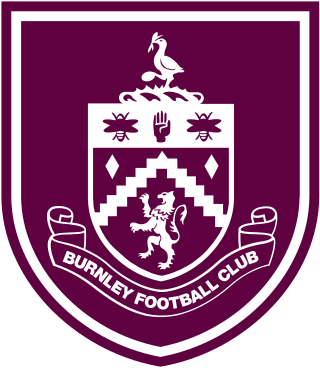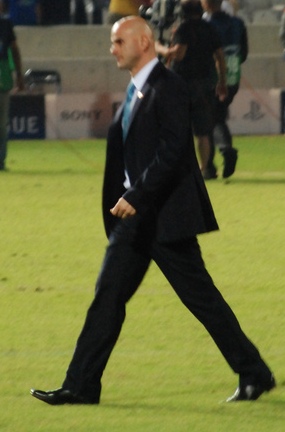Related Research Articles

Burnley Football Club is an English association football club based in Burnley, Lancashire, that competes in the Premier League, the first tier of English football. Founded on 18 May 1882, the club was one of the first to become professional, and subsequently put pressure on the Football Association to permit payments to players. The club entered the FA Cup for the first time in 1885–86 and was one of the 12 founder members of the Football League in 1888–89. From the 1950s until the 1970s, under chairman Bob Lord, the club became renowned for its youth policy and scouting system, and was one of the first to set up a purpose-built training ground.

Glentoran Football Club is a "professional" football club, based in East Belfast, that plays in the NIFL Premiership. The club was founded in 1882 and have since won more than 130 honours, making them one of the most successful football clubs in the world.

The Texaco Cup, officially known as the International League Board Competition, was an association football competition started in 1970, involving sides from England, Scotland, and Ireland that had not qualified for European competitions.
James McIlroy was a Northern Ireland international footballer, who played for Glentoran, Burnley, Stoke City and Oldham Athletic. He was regarded as one of Burnley's greatest players, having played 497 matches and scoring 131 goals. McIlroy also managed Oldham Athletic and Bolton Wanderers.
Terence McDermott is an English former football midfielder who was a member of the Liverpool team of the 1970s and early 1980s, in which he won three European Cups and five First Division titles. He was capped 25 times for England, and has had an extensive coaching career with Newcastle United (twice), Huddersfield Town and more recently, as assistant manager of Birmingham City.
Sligo Rovers Football Club is an Irish professional football club playing in the Premier Division of the League of Ireland. The club is based in Sligo in the west of Ireland.

The Northern Ireland Football League Cup is a national football knock-out cup competition in Northern Ireland open to all member clubs of the Northern Ireland Football League. It is the third-most prestigious competition in domestic Northern Irish football after the NIFL Premiership and Irish Cup. It should not be confused with the Irish League Floodlit Cup which ran from 1987–88 to 1997–98. Unlike the Irish Cup, the League Cup does not have a berth for UEFA Europa Conference League qualification. The cup has been operated by the Northern Ireland Football League since the 2013–14 season when it took over the administration from the Irish Football Association (IFA), after which the cup was renamed to the Northern Ireland Football League (NIFL) Cup.

Temuri Ketsbaia is a Georgian former professional football player and current manager. He is the current manager of the Cyprus national team.

Ciarán Martyn is a midfielder for Ballinamallard United of the NIFL Premiership.
Declan Devine is a Northern Irish football manager and former footballer who has played for and managed his hometown club Derry City in the League of Ireland Premier Division. He is the current manager of Bohemians.
Robert Irvine Coyle is a former Northern Ireland international footballer. Coyle is the most successful manager in the history of the Irish Football League. He is the Director of Football at Glentoran.

Thomas Morrison, also known as Ching Morrison, was a footballer for Glentoran, Burnley, Celtic and Manchester United, and for the Ireland national team.
Alexander Russell Elder is a former Northern Irish footballer, who played for Burnley and Stoke City as well as the Northern Ireland national team.
Ronald Joseph McFall MBE is a former football player and former manager of NIFL Premiership sides Glentoran and Portadown. He was most notably manager of hometown club Portadown for 29 years from December 1986 until his resignation in March 2016. At the time of his resignation he was the longest-serving manager in European club football, having held the record ever since Alex Ferguson stood down as Manchester United manager in 2013. He had two spells managing Glentoran, between 1979 and 1984 and 2018 and 2019.
Jackie Hutton was a Scottish football player and manager. He played for Wishaw Juniors early in his football career and then most notably for Scunthorpe United.
Burnley Football Club is an English professional association football club, founded in 1882. Burnley first played against foreign opposition—Scottish club Cowlairs—in 1885, and embarked on their first overseas tour in 1914, playing sides from the German Empire and Austria-Hungary. Further trips to foreign countries followed in the next decades. In 1955, UEFA launched the first officially sanctioned European club competition, the European Cup. Burnley won their second First Division title in 1959–60, qualifying for the 1960–61 European Cup. They eliminated French champions Stade de Reims in the first round before being sent out of the contest by West German champions Hamburger SV in the quarter-final. Burnley's next campaign in a European club competition came six years later, in the 1966–67 Inter-Cities Fairs Cup, where they were again eliminated by a West German side in the quarter-final. In 2018, Burnley qualified for the 2018–19 UEFA Europa League, reaching the play-off round.
Isaac McCandlish McDowell was a Scottish footballer and football manager who played as an inside-right for Dunoon Athletic, Glasgow Perthshire, Airdrieonians, Dumbarton, King's Park, Cowdenbeath, Port Vale, Coleraine, Linfield, and Ards. He later managed Ards, Linfield and Glentoran.
The 1959–60 season was Burnley's 61st season in the Football League, and their 13th consecutive campaign in the First Division, the top tier of English football. The team, and their manager Harry Potts, endured a tense season in which Tottenham Hotspur and Wolverhampton Wanderers were the other contenders for the league title. Burnley won their second First Division championship, and their first since 1920–21, on the last matchday with a 2–1 victory at Manchester City; they had not topped the table until the last match was played out. Only two players—Alex Elder and Jimmy McIlroy—had cost a transfer fee, while the others were recruited from Burnley’s youth academy. With 80,000 inhabitants, the town of Burnley became one of the smallest to have hosted an English first-tier champion. In the FA Cup, Burnley reached the sixth round before being defeated by local rivals Blackburn Rovers after a replay. Burnley won the local Lancashire Cup for the fifth time in their history after defeating Manchester United in the final. After the regular season ended, the Burnley squad travelled to the United States to participate in the first edition of the International Soccer League.
Michael O'Connor is an Irish professional footballer who plays as a striker for Ytterhogdals IK.
References
- ↑ Ryder, Lee (7 January 2021). "Former Newcastle star Tommy Cassidy hit by 'heartbreaking' Alzheimer's battle". ChronicleLive. Retrieved 27 July 2022.
- ↑ "Glentoran Football Club - the Pride of East Belfast - History".
- ↑ "Cassidy goes at Blyth". NonLeagueDaily.com. Retrieved 10 October 2012.
- ↑ "Ex-Northern Ireland star Cassidy has Alzheimer's: Wife of World Cup ace opens up about battle with disease". belfasttelegraph. ISSN 0307-1235 . Retrieved 27 July 2022.
https://web.archive.org/web/20110413080831/http://www.whitby-town.com/news10.php
Newly appointed manager of Blyth Spartans https://web.archive.org/web/20120611044429/http://blythspartansafc.co.uk/new_php/?p=7718